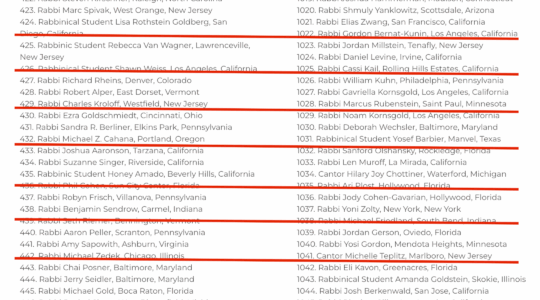(JTA) — President Donald Trump fired FBI Director James Comey on the same day that reports indicated Comey misstated, during testimony to the Senate Judiciary Committee, the involvement of Hillary Clinton aide Huma Abedin and her now-estranged husband Anthony Weiner in the email scandal his office investigated.
The firing also came as Comey is leading investigations into allegations that the Trump campaign and transition team had inappropriate contacts with Russia.
In a statement from the press secretary late Tuesday afternoon, the White House said Comey’s firing “will mark a new beginning” for the FBI. The statement said the search for a new director will begin immediately.
In a memorandum commenting on Comey’s firing, Deputy Attorney General Rod Rosenstein said the “FBI’s reputation and credibility suffered substantial damage” over the past year. The letter chided Comey for his conclusion, announced at a news conference on July 5, 2016, that as secretary of state, Clinton demonstrated no criminal intent in her handling of classified emails and that he was closing the case against her.
“I do not understand his refusal to accept the nearly universal conclusion that he was mistaken,” Rosenstein wrote.
Trump in a letter to Comey mentioned investigations into allegations that the Trump campaign had ties to Russia as a factor, although he did not make it clear why he was mentioning the investigations, and whether and in what way they were a factor in Comey’s firing.
“While I greatly appreciate you informing me, on three separate occasions, that I am not under investigation, I nevertheless concur with the judgment of the Department of Justice that you are not able to effectively lead the Bureau,” Trump wrote.
Rep. Jerrold Nadler, D-N.Y., rejected the contention that the firing owed to Comey’s handling of the Clinton case, linking it instead to the FBI’s ongoing investigation into alleged contacts between Trump campaign aides and Russian operatives.
“Don’t be fooled, this is about Comey investigating #TrumpRussia. Trump’s justification is nothing but pretext to stop investigation,” Nadler tweeted.
During the Senate committee hearing on May 3, ranking committee member Sen. Dianne Feinstein, D-Calif., asked why Comey felt it was necessary for the FBI director to reveal on Oct. 28, less than two weeks before the presidential election, that he was set to reopen an investigation into whether Clinton, the Democratic nominee, had criminal intent when as secretary of state she conducted government business through private email.
Comey explained there was evidence that new emails from Clinton could be found on a laptop seized from Weiner, the Jewish former congressman who resigned in a sexting scandal and now is under investigation allegedly for sexting with a minor. Included were emails from a private Clinton email account that the FBI had yet to access, Comey told Feinstein, explaining that the emails had come from Abedin.
Comey said that Abedin was forwarding hundreds of thousands of emails, some with classified information, to her husband to print out for her.
Pro-Publica and The Washington Post, citing unnamed FBI officials close to the investigation, reported Tuesday that Abedin occasionally forwarded a small number of emails to her husband for printing and that none were marked classified, though a small number were later deemed to contain classified information.
Comey said the FBI found no basis for concluding that Abedin or Weiner had acted with criminal intent.
On Monday, Comey addressed the Anti-Defamation League at its annual conference in Washington, D.C., calling for improvements in how law enforcement reports hate crimes.
“We must do a better job of tracking and reporting hate crime to fully understand what is happening in our country so we can stop it,” he told the group. “Some jurisdictions do not report hate crime data.”
JTA has documented Jewish history in real-time for over a century. Keep our journalism strong by joining us in supporting independent, award-winning reporting.






